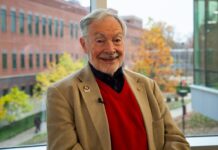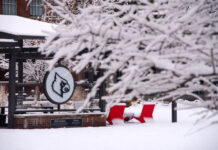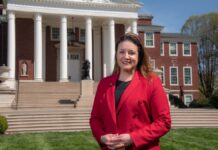
Dr. Robert Staat is as fierce an advocate as it gets for the University of Louisville. The longtime School of Dentistry Microbiology professor is also the director of the Sterilizer Monitoring Program, which he started in 1988. The program helps dental practices across the country maintain ADA recommended practices for selected infection control procedures.
Additionally, Staat has served on countless committees, is the faculty representative to the Kentucky Council on Postsecondary Education, is a member of the Faculty Senate and spent the past year serving as interim university ombudsman. In his spare time, he serves as president of the model railroad manufacturing business San Juan Car Co. Inc., based in Durango, Colorado.
On Dec. 31, Staat will retire after more than 40 years at UofL. He’ll remain on campus for another three or so years, however, as he continues to work through the phased retirement program, maintaining the UofL Sterilizer Monitoring Program.
UofL News had a chance to talk to Staat about his career, his motivation and his retirement plans.
UofL News: How did you end up at UofL?
Bob Staat: I grew up in the Rocky Mountains (Colorado, Wyoming and New Mexico) and have a BS and MS from University of New Mexico. I went to work with my MS and quickly found that I needed the PhD to get ahead and one of the consultants I worked with invited me to work with him at the University of Minnesota. I finished my degree and did some post doc work there. My first academic appointment was at the Medical University of South Carolina but UofL saw that I had NIH funding and came calling with a better offer. That was 42 years ago.
UofL News: In all of your years here, what would you say is your most memorable accomplishment at UofL?
Staat: My first memorable time was when I got the notice that my NIH grant had been renewed, which is major to an assistant professor. A few years later, I developed the Admissions Index, which was one of the first attempts to combine both academic achievements and nonacademic characteristics in the selection process of students into professional schools. My Faculty Senate work is very memorable and representing the faculty of all state-supported universities at the CPE has been equally rewarding. Perhaps receiving the President’s Distinguished Career of Service Award is the capstone to many memorable accomplishments.
UofL News: What has been the biggest challenge?
Staat: Funding of my laboratory was/is the biggest challenge. As my NIH funding dried up, I was fortunate enough to recognize that there was a new OSHA guideline recommending that all healthcare facilities using in-house sterilizers need to monitor their effectiveness using a biological system. This was similar to my Master’s work and with the support of the Dental School Administration I started an entrepreneurial program to service the needs of dentists and physicians. This activity quickly became self-supporting and a continuing source of income for my lab and the Dental School.
UofL News: What drives you to get involved with the university beyond teaching?
Staat: I didn’t start out with the goal of being involved in these activities but two professors who were active in the administration, Drs. David Cohn and Van Stewart, kept urging me to become active in the governance of the university. They said I was good at service activities and had a voice of reason. After being a senator for several years, I was fortunate to be elected to the senate leadership position.
UofL News: Based on your experience with the Faculty and Staff Senates and CPE, what would you tell employees about their work?
Staat: One of the UofL roles that has been very rewarding is the faculty representative to the staff senate. I think they are underappreciated at times and I recognize that without them the faculty could not function.
I was one of the nominees COSFL presented to the governor to represent the faculty of the state as a member of the Council on Postsecondary Education (CPE). The governor selected me and I have worked with CPE the last 4 years. My activities there range from the tuition setting group to helping build the new Strategic Agenda to work on the new diversity plan. What I have learned is that UofL is respected by other institutions for its quality and major steps forward.
UofL News: What is your favorite spot on campus?
Staat: I’m not sure I have a favorite spot on campus other than my office as I am lucky to have windows on two sides and friendly faculty and staff stopping by.
UofL News: What is your favorite thing about Louisville in general?
Staat: Two things come to mind; one is the restaurant scene … just too many good ones from which to choose. And, coming from the Southwest many years ago, I was amazed at the green grass and tall trees and still appreciate the greenery of Louisville and Kentucky.
UofL News: What are your retirement plans?
Staat: I’m not going to totally retire, but will go 40-percent time using the Phased Retirement plan and will still do some Dental School committee work and will keep the School’s Sterilizer Monitoring Program running strong. I will do some of the traditional retiree things such as traveling. I also have a small business manufacturing model trains and will increase my role in the business. Between the model trains and my woodworking hobby plus some travel, I may consider coming back to UofL fulltime to get a break … just kidding.
UofL News: What is the best piece of advice you can impart on your students?
Staat: You have a great opportunity here, but as with all opportunities, it is up to you perform. The faculty can’t take the exams for you. Keep up with the topics so you are not overwhelmed at test time. And finally, manage your money carefully while in college and remember that you are investing in yourself and that with a degree you will make on average about $1 million more during your lifetime. An excellent return on your investment!





























